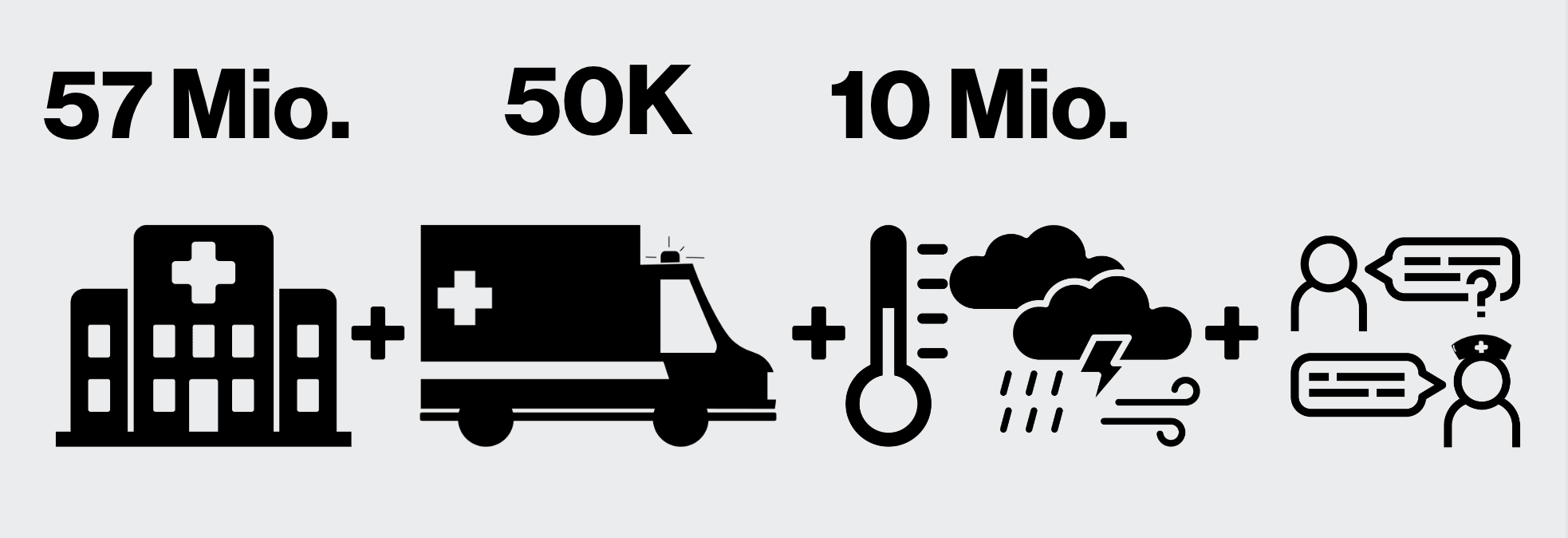The development of a heat early warning system – with this goal in mind, several research institutes, health organizations, and an international weather service have joined forces in the “HeatProtect” project led by CSH. The project investigates various climate scenarios to determine which measures can effectively protect us, even in the worst cases.
Despite the year being only halfway over, the news is already piling up: Over a thousand people died due to the heat during the Hajj in Saudi Arabia, dozens of cities in Mexico broke heat records with over 150 deaths, and the heatwaves in Greece have already claimed victims. Experts predict an above-average hot summer – and one thing is certain: it won’t be the last.
“Rising temperatures, longer heatwaves, and tropical nights, combined with an increasingly aging and urban population, will continue to drive up the demand for healthcare services. If we do not start preparing now, it is likely that in the next years and decades, we will face significant shortages and a massive deterioration in healthcare during heat periods,” explains Peter Klimek of the Complexity Science Hub, who leads the “HeatProtect” project.
And what would happen if, during a heatwave, the power went out for several days in a city whose healthcare system relies on air conditioning?
HEAT CONDITIONS IN AUSTRIA
Compared to the period from 1961-1990, the number of heat days (over 30°C) with tropical nights (over 20°C) in Austria has already doubled to tripled annually between 1991 and 2020: in Vienna from 10 to 21 days, in Innsbruck from 9 to 23 days, and in Graz from 4 to 17 days. Additionally, temperatures in Austria are rising faster than the global average, leading to an even higher risk for health and the healthcare system.
The consequence: According to AGES heat mortality monitoring, up to 500 people die annually from the effects of extreme heat. Hospitals and first responders record an increase in emergency calls and hospitalizations during and after heatwaves.
HEATPROTECT: VARIOUS PIECES OF THE PUZZLE
To prepare people and the healthcare system for all scenarios, partners in the “HeatProtect” project have come together, each holding different pieces of the puzzle: the research institutions Complexity Science Hub, MedUni Vienna, AIT Austrian Institute of Technology, and the Ludwig Boltzmann Institute for Digital Health and Patient Safety; health and social organizations Caritas Vienna, Johanniter Austria, and Gesundheit Österreich GmbH (GÖG); and the international weather service UBIMET.
“We can draw on a treasure trove of data for this project: 57 million hospitalizations over 22 years, 50,000 ambulance trips, 10 million weather data points from high-resolution time series, and survey data from paramedics, nursing staff, and hospitals on dealing with heat, allowing us to examine the relationship between heat periods and the strain on the healthcare system,” Klimek explains. Particular attention is paid to data security and anonymization, as it involves highly sensitive data.
HEAT EARLY WARNING SYSTEM
As part of the project, a heat early warning system is being developed to help both the public and institutions such as healthcare and nursing facilities prepare for and cope with heatwaves – for example, in staff planning, activating cooling centers, or opening Caritas climate oases.
Researchers are examining various climate scenarios – with varying durations, intensities, and numbers of heatwaves – and their local impacts on the additional heat-related burden on the Austrian healthcare system over the next 10 to 20 years. The results are concrete figures for hospitalizations and medical transports, depending on the climate scenario, heat adaptation measures, and region.
“We also consider effects such as increasing aging and the associated rise in multimorbidity – the simultaneous occurrence of multiple diseases,” Klimek explains.
PRIORITIZING MEASURES
“With the help of these climate scenarios, we can determine which measures better protect us from heat and should therefore be prioritized. With this knowledge, we significantly support the implementation of national and regional heat protection plans,” explains Marianne Bügelmayer-Blaschek, climatologist and researcher at AIT.
“Although there are already national and provincial heat protection plans with catalogs of measures for short- to medium-term adaptation to rising temperatures, an evidence-based evaluation and thus a basis for prioritizing measures is still lacking,” adds Katharina Brugger, Senior Health Expert at GÖG.
Specific measures for preparing for longer heat periods can be temporary, such as a driving ban on particularly hot days, or medium-term, such as greening and changes in urban planning.
PARTICULARLY AFFECTED
The increasing strain on the healthcare system affects not only the growing number of patients but also places a massive additional burden on the staff. “The work of paramedics is extremely demanding – both physically and mentally. Under the influence of heat, this work – from transporting equipment in steep staircases to resuscitations – becomes even more intense and pushes those involved to their limits,” explains Georg Aumayr, Head of Research and Innovation at Johanniter Austria.
Thomas Wochele-Thoma, Medical Director of Caritas Vienna, adds: “Heat periods place a massive burden on both helpers and those in need of help. This can range from mild symptoms of exhaustion and irritability to dehydration and circulatory collapse.”
All this can become a massive challenge for people and the healthcare system, “which is why the “HeatProtect” project could be groundbreaking in enabling us to best cope with climate changes,” Klimek concludes.
ABOUT THE PROJECT
In the HeatProtect project, partners AIT, Caritas Vienna, Gesundheit Österreich GmbH, Johanniter Austria, Ludwig Boltzmann Institute for Digital Health and Patient Safety, MedUni Vienna, and UBIMET, under the leadership of the Complexity Science Hub, are working on the development and data-driven evaluation of climate-friendly measures to reduce heat-related health risks.
HeatProtect is funded by the Austrian Research Promotion Agency (FFG).




